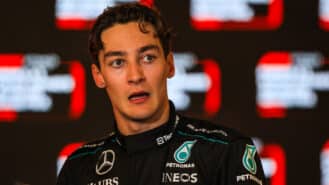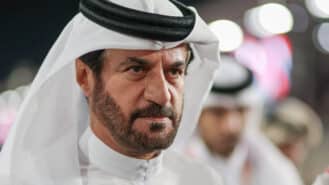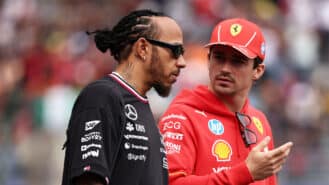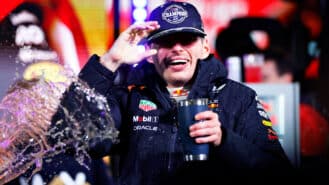
Verstappen proves Russell right: Abu Dhabi GP 2024 – Up/Down
Verstappen's prang at the first corner of the F1 finale in Abu Dhabi vindicated George Russell's recent rant
Despite it being 12.15pm on a Thursday afternoon there’s a queue outside Carluccio’s restaurant in Bicester Village. I’m told to wait and handed a menu. A matter of moments later and Tom Onslow-Cole is strolling towards me, cap on, shopping bag in hand.
Even after seven years in the British Touring Car Championship no-one casts a second glance – his cap hides his face and it’s doubtful there’s a lot of crossover between the stands at Croft and your Thursday afternoon Bicester Village shoppers.
If any of the public had been to a British GT race in 2014, though, he may well have been recognised as in the winter of 2013 he made the decision to quit the BTCC and start racing GTs full time.
Onslow-Cole’s early career was typical of many BTCC drivers – he was taken to watch the racing aged eight and was immediately hooked: “I grew up watching it, it was all I knew”.
The sight of Rickard Rydell, Alain Menu, Paul Radisich and John Cleland rubbing paint in Volvo 850s, Renault Lagunas, Ford Mondeos and Vauxhall Cavaliers was enough to set him on a course that would continue for the next 17 years of his life.
In 1995 he started karting at a national level and then, aged 14, he moved to T-Cars. Come 2003 he lined up on the Renault Clio Cup grid and three years later he was crowned champion. “Up until then my entire life’s ambition was to win that championship in order to get into the BTCC,” he says as water arrives at the table. It proved to be his way onto the hallowed BTCC Tarmac and in 2007 he was on the grid driving a BMW 320si for West Surrey Racing alongside Colin Turkington.
“When I first arrived in the BTCC I spent my own money to pay for a seat because at the time there were seven or eight drivers being paid and there was a potential return on that initial investment.” Back in 2007 both Vauxhall and SEAT had works teams and each employed the services of three drivers.
Things started well with a win at Snetterton in his first season. The following year, with two wins at Thurxton, he had three professional contracts on the table and two of them came with a wage. This professional motor racing business wasn’t too difficult was it?
“The recession kicked in and after that everything changed,” Onslow-Cole comments. “Even if you could land a paid seat, you weren’t paid much and it became a case of raising sponsorship. You needed to raise more than you needed to pay a team so that you could earn a living.”
In 2009 there were more wins at Brands Hatch, Oulton Park, Silverstone and Donington, but the big break never arrived. Of course, he was desperate to be crowned a BTCC champion: “I chased it year after year, trying to get into the best car I could, budgets and sponsors allowing, and then in the winter last year I suddenly thought ‘I’m doing the same thing I was doing five years ago’. Even if I was to win the championship I’d still be hunting for sponsors, trying to put deals together.”
Two-time champion Jason Plato has pulled off a master stroke with his marketing agency Brand Pilot by getting Tesco on board in 2012. However, he’s still out there, after 88 victories, looking for sponsors in order to earn a living.
The BTCC is a fantastic series – it’s crowd-pleasing, bumper-rubbing racing, but there’s no ‘next step’. The WTCC, despite the arrival of Sébastien Loeb, has a smaller profile than its British counterpart (in the UK at least) and you also pound round the same circuits year after year.
Imagine how Matt Neal feels when he heads to the grid for the third race of a weekend at Brands Hatch? He’s been in the championship for 24 years. Twenty-four years! That’s surely some sort of world record. “Yes,” says Onslow-Cole, “it always made me laugh that when I was team-mates with Fabrizio Giovanardi [in 2008] and looked at his CV – he was racing Formula 3 cars the year I was born…”
The lures of GT racing aren’t difficult to get your head round – there are championships all over the world, there are 24-hour races, sprint races, manufacturers, professional (paid) drivers and you can race at wildly different circuits from Le Mans to Angelsey, from Daytona to the Nordschleife.
Onslow-Cole’s “eyes were opened” in terms of racing outside of the BTCC with a drive at the 2012 Donington round of the International Superstars Series aboard a Jaguar XFR and then by doing a round of the MSA Endurance Championship in 2013 alongside his touring car season. This year he’s taken on a full season in British GT mostly driving an Aston Martin Vantage alongside Paul White. He’s also done some rounds in the Spanish GT, the V de V Series and the Blancpain Endurance Series.
The transition hasn’t been seamless, but results have been steady with plenty of podiums and only a few mistakes. “I had to learn a lot quite quickly,” he admits. “The biggest problem I had for my first 24-hour race [the 2014 Dubai 24 Hours] was that I was so excited I couldn’t sleep. I hadn’t had much GT experience and going straight into a 24-hour one was like having all my Christmases at once. I didn’t sleep at all and that doesn’t half take its toll when you’re doing a 3am stint… I’ve learnt from that.
“The other thing that took a bit of getting used to were the driver changes. I’m used to getting comfortable in the car, getting the straps just so, putting my right glove on before the left… In GT racing a guy pulls up, he jumps out, you’re thrown in and you’re off. The first driver change I did I wore a heart rate monitor and I peaked at 198 beats per minute just after the driver change.”

Onslow-Cole and GT racing are clearly on their honeymoon, but it’s hard to see why they’ll fall out of love anytime soon. He’s keen not to make any long-term plans with regards to LMP cars, America, NASCAR or returning to the BTCC as he wants to make sure he becomes a “master of GTs”.
“I really haven’t seen a downside to it yet and GT racing has some great momentum at the moment. The more drivers outside of GTs I speak to, the more enthusiastic they seem to be about coming and doing it.”
As we finish our food – I’ve ordered quite possibly the most calorific pasta on the menu, Tom a light salad – talk turns to his work with the MSA on driver coaching.
“It’s funny,” he says, “we practice our sport all season and then in order to keep our eye in over the winter we go to the gym. That doesn’t happen in many sports does it? If you’re a runner, a swimmer, a golfer, you practice every day, all year round. Drivers nowadays are the ‘click-in’ bits – when you go testing you’re there to test things on the car, not to learn. Yes, there are simulators out there, but they’re expensive.

“I’m working with the MSA to help them develop a coaching programme, a curriculum that fits with coaching standards in other sports. Even though there aren’t many in relation to other sports, drivers do have driver coaches, but they don’t talk about them. There’s a lot of bravado in motor sport…
“The beauty of a coach is that they look at everything you’re doing subjectively. The problem we have at the moment is that when I speak to young drivers about a coach they want last year’s winner. That’s not necessarily going to work – look at Andy Murray’s old coach, Ivan Lendl. He was a great player, but he wouldn’t stand a chance against Murray now. He doesn’t have to. In motor sport we’re still at the stage of ‘because I won a race I can teach people’.”
After our lunch Onslow-Cole was off to Angelsey to take part in the Race of Remembrance (which he won), but our parting words were about Austin A40s and the cost of historic racing. He’s bought his father an ARDS test and they’re hoping to do some races in the A40 next year. What is it about BTCC drivers and Austin A40s?

Verstappen's prang at the first corner of the F1 finale in Abu Dhabi vindicated George Russell's recent rant

FIA president Mohammed Ben Sulayem seemed intent on making F1 a united front by the end of the 2024 Qatar GP – against him

Leclerc erupted after feeling wronged one time too many by Sainz in Vegas – but the challenge posed by his team-mate next year, Lewis Hamilton, will be much greater writes James Elson

2024 has been Max Verstappen's masterclass – it should go down in history as one of F1's greatest titles